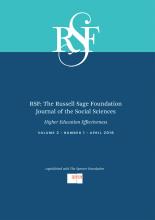Abstract
Lack of preparation in science leads to high rates of attrition among science, technology, engineering, and mathematics (STEM) majors, even among students who are highly oriented toward STEM. Using data for twenty-seven countries from the 2006 Program for International Student Assessment, we compare the United States with other industrialized countries in terms of fifteen-year-olds’ science achievement and their expectations to focus on STEM in the future. The United States trails most countries in the mean science achievement of the general student population and among students expecting to pursue STEM majors or careers. Lack of curricular standardization in the United States is related to this lower science achievement. Countries with higher curricular standardization exhibit higher average science achievement scores; science achievement and students’ future orientation toward science are also better aligned in these countries. We discuss the implications of these findings for American colleges and universities as they seek to reduce student attrition in STEM fields.
- Copyright © 2016 by Russell Sage Foundation. All rights reserved. Printed in the United States of America. No part of this publication may be reproduced, stored in a retrieval system, or transmitted in any form or by any means, electronic, mechanical, photocopying, recording, or otherwise, without the prior written permission of the publisher. Reproduction by the United States Government in whole or in part is permitted for any purpose. Direct correspondence to: Siqi Han, Department of Sociology, The Ohio State University, 238 Townshend Hall, 1885 Neil Avenue Mall, Columbus, OH 43210, Han.607{at}osu.edu; and Claudia Buchmann, Department of Sociology, The Ohio State University, 211 Townshend Hall, 1885 Neil Avenue Mall, Columbus, OH 43210, Buchmann.4{at}osu.edu.
Open Access Policy: RSF: The Russell Sage Foundation Journal of the Social Sciences is an open access journal. This article is published under a Creative Commons Attribution-NonCommercial-NoDerivs 3.0 Unported License.






